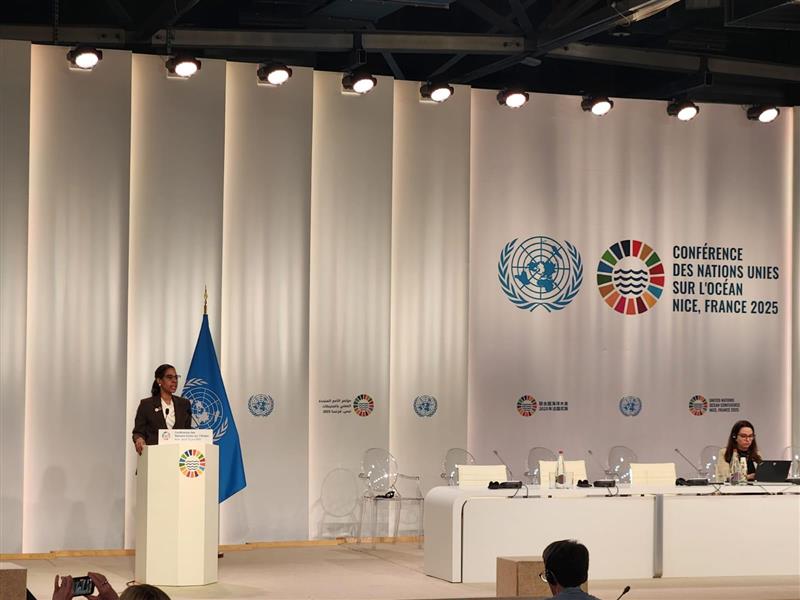Nice, France – 12 June 2025 -The high-level 2025 United Nations Ocean Conference to support the Implementation of Sustainable Development Goal 14: Conserve and sustainably use the oceans, seas and marine resources for sustainable development took place in Nice, France, from 9 to 12 June 2025, co-hosted by France and Costa Rica.
The overarching theme of the Conference is “Accelerating action and mobilizing all actors to conserve and sustainably use the ocean”. The Conference supported urgent action and identified ways and means to support the implementation of SDG 14. It built on existing instruments to form successful partnerships towards the swift and effective implementation of ongoing processes that contribute to the conservation and sustainable use of the ocean.
The Secretary-General of the International Seabed Authority, Leticia Carvalho, delivered official remarks to the plenary of the UN Ocean Conference on Thursday, 12 June 2025. Read her full statement:
***
Excellencies, Distinguished Delegates, Ladies and Gentlemen,
It is an honour to address you today at the third UN Ocean Conference. Let me thank Costa Rica and France for your amazing efforts in bringing the world together, to unify, for ocean action.
We are all aware that this is a pivotal moment for the ocean and for the future of our planet because of the challenges we face—climate change, biodiversity loss, rampant pollution, and widening inequality.
These challenges demand systems thinking and innovative solutions beyond fragmented approaches. In the ocean governance space, it means the pursuit of evidence-based, collective, and inclusive, problem -solving, data sharing, scientific endeavor, equity, and solidarity.
Multilateralism remains our most powerful tool to achieve prosperity for the future we want. Though we will differ on approaches, the spirit of multilaterialism will enable us to come together around shared values and ambitions.
It is only through multilateral cooperation that we can deliver meaningful outcomes for people and planet—especially in areas beyond national jurisdiction, where no single State bears sovereignty, but all share responsibility.
In this spirit, the International Seabed Authority stands as a concrete example of what multilateralism can achieve. Established under the United Nations Convention on the Law of the Sea (UNCLOS)—the Constitution for the Ocean—the ISA is the only intergovernmental body mandated to manage the mineral resources of the seabed beyond national jurisdiction, as the common heritage of humankind, while equally, protecting the marine environment.
To re-emphasize this point… the deep seabed is the planet’s only global commons enshrined by international law as the common heritage of humankind.
For nearly three decades, the ISA has carried out this mandate with a singular purpose: to ensure that the exploration, and potential exploitation, of seabed minerals is carried out for the benefit of all, particularly developing States, and in full respect of environmental protection.
Since 1994, we have developed unique expertise in marine spatial planning, capacity development, data sharing, and in crafting a legal framework that balances development with robust environmental safeguards. These contributions represent essential building blocks for the effective implementation of the post-2020 Global Biodiversity Framework and the achievement of SDG 14.
Through our open-access DeepData platform, we are disseminating environmental data collected over decades—over $260 million invested by ISA contractors in deep-sea environmental studies.
Importantly, the ISA has also taken concrete steps in conservation. Over 1.9 million square kilometers of the seabed in the Clarion-Clipperton Zone are currently protected from any future exploitation. We are committed to expanding this network of protected areas, guided by science and the precautionary approach.
As the Secretary-General of an intergovernmental body like the ISA, my duty is very clear: to facilitate constructive dialogue and negotiations to achieve consensus on the way forward. It is therefore, NOT, for me to articulate a position for or against deep sea mining. This is a decision that lies squarely with countries who will need to navigate based on the best available science, market needs, economics, environmental concerns and consultation with their constituents.
However, I can hold a position. And this position is that parties to UNCLOS and ISA need to deliver a strong, science-based regulatory regime that will ensure effective governance of the future exploitation of mineral resources in the deep sea and protect the marine environment, aligned with their established roadmap from 2023.
This week, in no uncertain terms, I made this point in my Economist article that stated that the Deep Sea Needs Rules. You will have heard this sentiment echoed in this very plenary by President Lula of Brazil and the UN Secretary- General who stated that the deep seabed can not become the Wild West.
Whatever side you are on, we must all agree that rules-based governance is the only reliable pathway.
Ladies and Gentlemen,
Effective ocean governance is not an abstract concept—it is a necessity. And UNCLOS provides the legal certainty and institutional framework for all States to work together, in good faith and in common cause.
As we gather at UNOC3, I urge you to recognize the transformative potential of the institutions created under UNCLOS.
As we explore the potential of one of the planet’s final frontiers, let us work together to reach higher, NO, let me say DEEPER, goals.
Let us ensure that we do not make the mistakes of the past.
Please join us in championing the collective stewardship of the deep seabed, and its resources, and in forging a path towards a prosperous world in harmony with nature.
I thank you.


